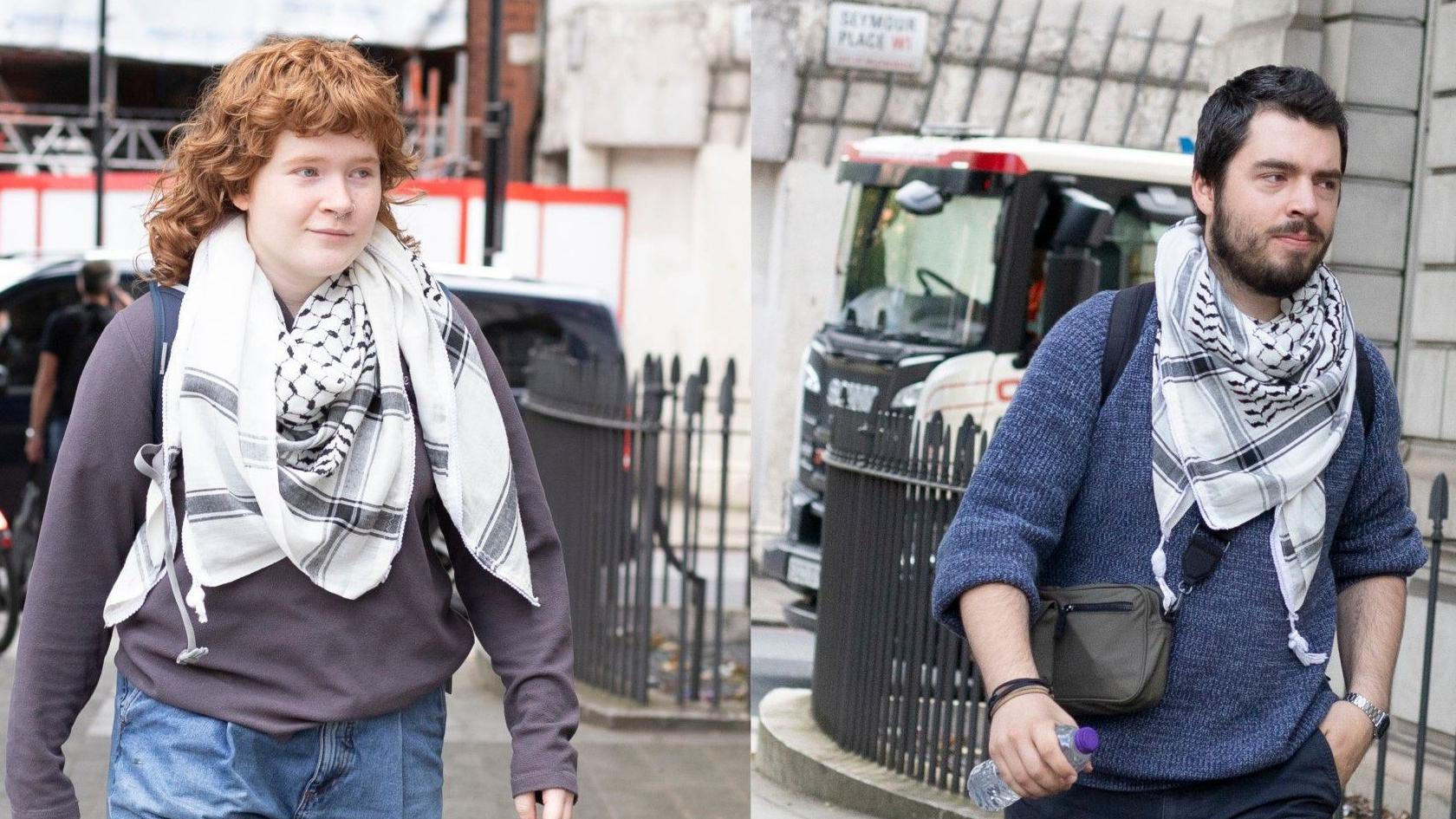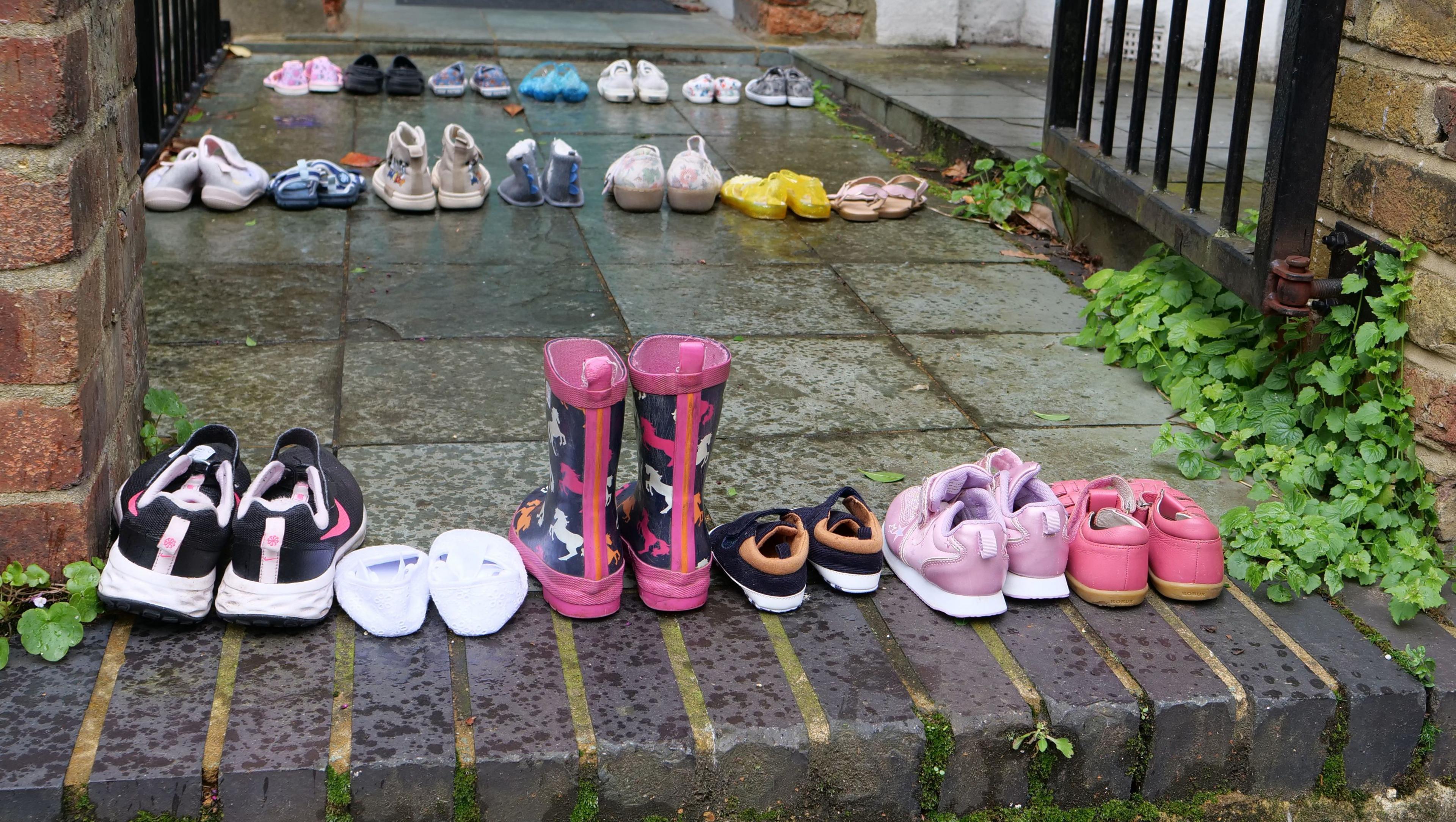Three guilty over protest at Sir Keir's home

Victoria Starmer, photographed with Sir Keir in May, says she felt "uncomfortable"
- Published
Three people have been found guilty of public order offences after a pro-Palestinian demonstration outside Sir Keir Starmer's house.
Leonorah Ward, 21, from Leeds; Zosia Lewis, 23, from Newcastle-upon-Tyne; and Daniel Formentin, 24, also from Leeds, were also found guilty of breaching court bail, but had denied all the charges.
Sir Keir Starmer's wife told Westminster Magistrates' Court on Wednesday that she felt "a bit sick" and "uncomfortable" during the protest.
Finding the trio guilty after a one-day trial, District Judge Michael Snow said they had been directed to leave the premises but had "continued" regardless.

Leonorah Ward and Daniel Formentin turned up to court wearing a keffiyeh, as a sign of solidarity with Palestinians
"The person who resides here is a senior politician," said the district judge.
"In the last two years two Members of Parliament have been murdered."
The court heard that on 9 April, activists from the group Youth Demand had hung a banner outside the London house that read: "Starmer stop the killing" and surrounded it with red hand prints.
Youth Demand describes itself as a "new youth resistance campaign fighting for an end to genocide".
Rows of children's shoes were also laid in front of the door, the court heard.
'I felt apprehensive'
Lady Starmer had just returned from a shopping trip with her son when they spotted the protesters, the court heard.
She drove around the corner before contacting Sir Keir's office because she "didn't want to stop and be obvious", she told the court.
Asked how seeing the protest had made her feel, Lady Starmer said: "I felt a bit sick, to be perfectly honest.
"I felt apprehensive and uncomfortable."
Asked by Andrew Morris, defending, if she knew it was a "peaceful protest", Lady Starmer said: "It would look like a peaceful protest if it hadn't been outside my home."
Put to her by Laura O'Brien, representing Ward, that she did not want the added publicity from the demonstration, she said: "That was absolutely not in my mind."

As well displaying a banner, the protestors allegedly left children's shoes
Sgt Mark Upsdale from the Met Police, who arrived at the scene at around 14:00 BST and made the order for the arrests, also gave evidence at the trial.
Asked by prosecutor Jacob Hallam KC if the protesters were making their intentions known to the officers, he said: "They said there was a plan but 'we are not willing to tell you', or something to that effect."
Sgt Upsdale said holding the protest outside somebody's house, instead of outside the House of Commons or Sir Keir's offices, was "inappropriate".
The court was also shown footage shared on social media of the demonstration, which included clips of the three defendants speaking, and police body-worn footage of the protesters being arrested by officers outside the home.
Representing himself, Formentin told the court he targeted Sir Keir because he believed the Labour leader was "not accurately representing the country" over the conflict.
"There is an overwhelming sense that young people in this country do want a ceasefire in Palestine," he claimed.
Marketing consultant Formentin added: "We had no plans to confront anyone."
Section 42 of the Criminal Justice and Police Act 2001 covers the harassment of a person at their home address if a police officer suspects it is causing alarm or distress to the occupant.
When Mr Hallam put it to him that they still would have been intimidating and threatening, Formentin said: "No."
Put to him that they never contemplated how someone living in the house might find the protest distressing, he said: "I think it could be seen as distressing."
Listen to the best of BBC Radio London on Sounds and follow BBC London on Facebook, external, X, external and Instagram, external. Send your story ideas to hello.bbclondon@bbc.co.uk, external